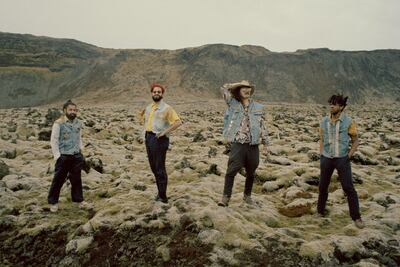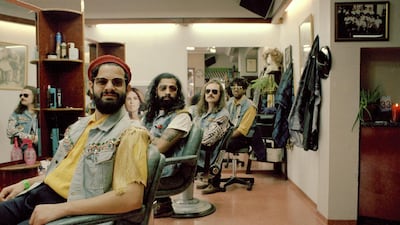We often call it destiny when discussing how a great band got together – that Lennon-meets-McCartney moment – but usually the main cause is much more prosaic: good old-fashioned geography. Those artists lived in the same city, hung out a lot, then the musical magic gradually occurred. What happens, though, when an ambitious band is thrown apart? And, indeed, thrown back together?
“It was really interesting going into this album, being able to work on it together again,” says Kamal Rasool, the frontman of Flamingods. “Living apart can be a good and bad thing.”
And Flamingods have endured more separations than most. The Bahraini psych-rockers, who played the Glastonbury Festival last weekend, are preparing to perform at numerous other festivals this summer in support of their enjoyably retro-funky new album, Levitation. The title is appropriate, as they certainly have risen above some tricky circumstances.
When we think of bands living apart, it tends to be big stadium acts whose motivations have shifted. One member relocates to LA perhaps; one prefers London, another moves somewhere more exotic. Occasionally they reconvene, slightly reluctantly, for a lucrative tour.
Flamingods' dispersion was much more disruptive. As Rasool suggests, this is the first album in several years that his band could physically create together. The core quartet had all moved from Bahrain to Britain as students, lured by the country's legendary music scene. "We were finally going to festivals, [like] Glastonbury, having our minds blown," says the singer. "Then, when they changed the visa laws, I basically had no choice but to move away."

Red tape hampered their rock dreams. Rasool moved to Dubai with bandmate Charles Prest and found other creative outlets, but still had unfinished business. So Flamingods found a way to continue, and made two albums during that displaced period. Their last one, 2016's Majesty, featured just a few live studio sessions – when their UK-based bandmates "came to visit", Rasool explains – while 2014's Hyperborea was recorded entirely remotely.
“It was all done online, then sent to someone to mix it,” he says. “Everything was [done via] Facebook Messenger, trying to convey stuff, sending logic files, song stems. It was a very complicated system.”
It was worth the effort , however, as the subsequent reviews for that album were hugely positive. Remote recording can work, then, and it raises the intriguing possibility of bands never actually meeting, at all.
Australian producer Jayden Rando knows a bit about this: in 2016 he participated in a promotion run by a national broadband operator, and joined a virtual trio with two female folk singers, all of whom lived in different parts of Australia.
“We would hop on a video call and really just pass ideas around,” he explains. “They both worked together to write the song, then gave me the recordings to just ‘do my thing'.”
Their first release, a folk-pop track called Firefly, emerged in early 2017 and was also well-received. But, alas, their successful run soon stalled.
“It sort of just ended there,” Rando admits. “The girls live on the opposite side of the country to me; it was never really going to work out. I have projects now where I work with people who live on the other side of the country but we get together enough to keep the close relationship required to have a successful team.”
Clearly the classic concept of a 'band' requires some in-person interaction. Flamingods' new record certainly sounds like a group revelling in each other's company, now they all live in Britain again. Heavily inspired by 1970s Middle Eastern disco, Levitation features "lots of jams", says Rasool. The track Astral Plane in particular, "we were rinsing and repeating it for days, to get that bouncy rhythm to it – that track wouldn't have existed a few years ago".
Some bands, in contrast, are all about live interaction. The multi-national garage-rock trio Abjects became a popular fixture on UK stages from 2013 onwards, but circumstances later saw them scattered across the globe: bassist Yuki Ishii in Japan, Italian drummer Alice Notaristefano in the UK and singer/guitarist Noemi Santiago in her native Spain. Did they consider the 'virtual band' approach?
“That's something we are yet to try,” says Santiago. “The face-to-face communication is really important to us when we're arranging songs; the real magic happens when we're all together in the studio. It's difficult to achieve the same bounce of ideas, feelings and energies via chat messages.”
That initial period of separation did throw up some interesting lyrical themes on their recent debut album, Never Give Up. The title song "specifically talks about this crazy process," she says, "of starting and stopping the band so many times, and our strategies to cope with it. It's not an easy situation, but we've managed to adapt."
Abjects now find themselves in different countries again, but touring is the light at the end of that tunnel. “It has actually been quite tricky to keep on going,” Santiago admits, “but I guess that has pushed us to be more proactive at organising tours and setting important milestones to look forward to. In terms of preparing the album in the studio, we had to concentrate our efforts in shorter amounts of time, feel the pressure and be at our best. We've had to focus more.”
There are certain upsides to living apart. As an electronic producer Rando regularly collaborates remotely, which lets him work with "so many more crazy people, with different influences". It also keeps things concise. Rasool sometimes sounds positively nostalgic for the filesharing era: Flamingods' lengthy jam sessions may be fun, but then they need to wade through "hours of recordings", he laughs, ruefully.
Rasool recalls other positives from the band’s displaced days. “I think it gives you different perspectives,” he says. “In Dubai, the area we stayed in was a very Pakistani and Filipino neighbourhood, we were getting so influenced by those cultures.
“Living on different continents, everyone was bringing something different to the table, trying to capture the imagery and sounds that they’re experiencing. So you get quite an interesting result.”
Perhaps they should separate again, before the next record?
“Exactly, I’m going to have to send the rest of the band off to, say, the Bahamas,” jokes the singer. “And I’ll stay in cold Britain, then we’ll see what the results are like.”



